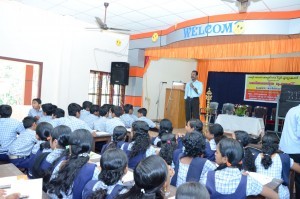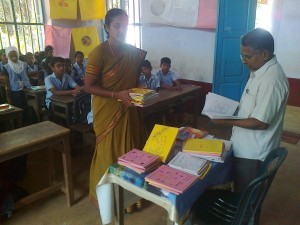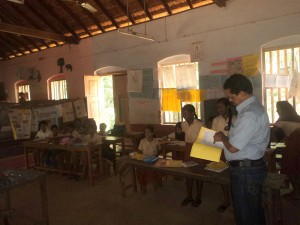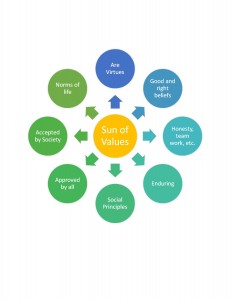With a view to participate, contribute and to make teacher trainees intellectually competent to deal with multiple perspectives of academic, social and political issues St. Thomas College of Teacher education is involved in various research studies and projects related to education. Such studies and projects include independent works initiated by the institute and works undertaken in collaboration with other agencies functioning in the field of education. Its details are:
| Sl. No. | Title of the study/Projects | Year | Collaboration | Amount of External Fund | Remarks |
| 1. | Ramanujan Mathematical Project | 2012-2013 | SSA Idukki | 55000 | Successfully Completed |
| 2. | Inculcating Values through GAD Strategy | 2012-2013 | Independent Project (Technical Advice from NCERT) | Won National Award of NCERT for Innovative Practices & Experiments in Education | |
| 3. | Achievement Level of Standard II Students in Kerala | 2014-2015 | SSA Kerala | 300000 | Successfully Completed and report submitted to SSA Kerala |
| 4. | Achievement Level of Standard III Students in Kerala | 2014-2015 | SSA Kerala | 300000 | -do- |
| 5. | Assessment of Training needs of Elementary School Teachers- A Combined study of UNICEF & SSA Kerala | 2016 | UNICEF & SSA Kerala | 300000 | Successfully Completed and report submitted to SSA Kerala |
Project 1
Ramanujan Mathematics Project
This project was launched and completed in the academic year 2012-2013. It was done in connection with the National Mathematics Year Celebrations.
The objective of the project was to enhance the interest and the achievement motivation of Upper Primary Students in Mathematics. The target group was standard V, VI and VII students of all the schools in Kumaramangalam Panchayat in which St. Thomas College is situated.

-
Planning Workshop for the Ramanujan Mathematics Project. The Project Coordinator Dr. C. C. Kurian presents the draft proposal.
The project was fully financed by SSA, Idukki and supported by the General Education Department and DIET-Idukki. The implementation of the Project was made by following an activity calendar prepared by the College. Convergence meeting, module preparation workshop, orientation for headmasters and mathematics teachers of the schools included in the study, monitoring and on-site-support by college faculties and BRC-trainees, seminars, quiz programmes continuous evaluation etc. were the major activities of the project.
The main focus of the project was the introduction of an innovation test procedure called “Instant Group Reward Test”. It is a technique proved effective and advocated by NCERT for enhancing achievement motivation among students.
Continuous monitoring was an essential requirement of the project. monitoring was done by project team members, Educational officers & SSA officials.
Mathematics seminar was another important programe conducted in connection with the project. Students of Std.V to VII of all the schools included in the project participated in the seminar. The seminars were conducted in St. Thomas College Auditorium.

-
Prof. K.J. John, Vice Principal & HOD of Statistics Department, Newman College Thodupuzha presents the seminar paper on “Vedic Mathematics”
The project was finished with a public meeting at Kumaramangalam, followed by a rally. In the rally students, teachers, parents, educational officers, DIET faculties and staff of St. Thomas College participated.
Awards, Trophies and Merit certificates were distributed in the closing ceremony

-
Smt. Anila George, Deputy Director of Education, Idukki, gives away the prizes to the winners of the Mathematics Quiz.

-
Smt. Anila George, Deputy Director of Education, Idukki, gives away the prizes to the winners of the Mathematics Quiz.
On completion of the project, the report was submitted to the District project office, Idukki. The DPO Dr. V.N Shaji received it.
Project 2
Inculcating Values through GAD Strategy
(A Project undertaken by St. Thomas College of Teacher Education – Under the Innovative Practices and Experiments of NCERT)
Summary of the Project Report
Inculcating Values Through Game and Discussion (GAD) Strategy
Genesis of the study
Inculcating values in students is a felt need of the day due to various reasons. At the same time there is a deficiency of suitable strategy for the inculcation of values in children. In such a context St. Thomas College of Teacher Education, Mylacompu thought it would be worthwhile to think about certain innovative and interesting methods for the inculcation of values.
Preparatory Works and Designing of the study
Experimental method with equated group design was used for the study. B.Ed students of our institution were taken as the sample. As part of the preparatory works, preparation of Bank of Games/Activities, construction of tools and formation of Experimental and Control Groups were carried out.
Execution of the project
The title of the study is Inculcating Values through Game and discussion (GAD) Strategy
Operational definition of key terms
Game: In the present study games means an activity in which students engage with interest.
Game and Discussion (GAD) Strategy:
In Game and Discussion Strategy students are led to engage in certain games first, and is followed by a discussion on it in the class. Such game will be having relevance to a specific value included in the study.
Objectives of the study
- To develop an effective strategy for the inculcation of values
- To enable the B.Ed trainees for inculcating values in students while teaching.
- To prepare a bank of games suitable for the inculcation of values.
In order to achieve these objectives various activities were carried out under 3 phases viz (a) Pre- test (b) Implementation of activities and (c) Post- test.
Under the implementation of activities one unit Value Education was taught in the Experimental Group using GAD Strategy. In the Control Group the same unit was taught in traditional method.
Description of the GAD Strategy Implemented in the Experimental Group
Various games (activities) were conducted in the Experimental Group until the end of the experiment as follows:
1ST Day of the Experiment
GAD Activity: Brainstorming and Ray drawing from the Sun of Values.
In order to get the students a clear idea about the concept of values, a brainstorming session was done in the class. For this, after giving certain hints regarding values the teacher divided the class into 5 groups with necessary instructions.
Drawing Rays for the Sun of Values
When the brain storming session was completed the teacher drew a big circle at the middle of the black board and labeled it as the Sun of Values. Then as an example, he drew a ray from the Sun and wrote a point regarding values. After this, the members of each group drew rays and completed the sun of values as given below.
Based on the picture, the students developed a definition for the term ‘values’. Then the teacher presented certain definitions regarding ‘values’. The students modified their definition by comparing the teacher definition.
At the end of the period certain assignments such as preparation of brief note on values, different types of values etc. were given to the students. In addition to these, a question: ‘Can teachers play a significant role in inculcating values in students?’ was also asked.
On completion of the GAD activities of the day the unit Value Education was subdivided into small units, and allotted to different students for seminar presentation in the ensuing classes.
2nd Day of the Experiment
On the second day onwards the subunits allotted were presented by each student every day. Consolidation of seminar points was done by the teacher. Before the beginning of the class GAD activity was carried out every day.
GAD activity of the second day: WAX and PEARL Experiment
Showing the students a piece of a thick wax candle and a small pearl the teacher asked the students:
“Can I insert this pearl in to this candle?”
The students gave different responses such as:
Not possible, difficult, can do by pushing the pearl etc.
Then the teacher with the co- operation of the students demonstrated to melt the candle wax in a vessel using a sprit lamp. Within a few minutes the solid wax candle has fully transformed in to liquid form. A student poured a portion of the liquid wax into a transparent test tube shaped vessel. The liquid wax in it was allowed to cool by dipping its bottom in cold water.
Meanwhile it reached in a flexible stage, a student put the pearl in to the tube as directed by the teacher. After a few minutes the remaining portion of the melted wax was poured into the tube above the pearl, keeping the bottom of the tube dipped in cold water.
Soon the whole wax in the tube changed to solid form. All students observed that the pearl is then within the new candle.
Then a discussion was held by comparing the wax as child’s mind and pearl as value.
3rd Day of the Experiment
Class started with reading of an incidence from Mahatma Gandhi’s life ‘STEALING AND ATONEMENT’. (The reading material is given as appendix in ‘Bank of Games)
After the reading, a discussion was made based on relevant discussion points.
4th Day of the Experiment
Class started with a story making session as GAD activity. ‘The Truthful Wood Cutter’.
The class was divided into 7 groups. Copy of out-line story of The Truthful Wood Cutter was distributed to each group. All groups were instructed to develop each story according to their imagination, but based on the outline given to them. It was also told the students to describe honestly what would have happened if you were in the place of the wood cutter.
Other Days of Experiments
In a similar way the class in the experimental group was started with a GAD activity in all days.
Findings and Conclusions
GAD strategy is an effective method for the inculcation of values in students.
GAD strategy can be effectively used for equipping the B.Ed trainees for imparting value education.
Educational Implications of GAD Strategy
This strategy may be practised in schools for value education. GAD strategy may be included in the curriculum transaction strategies of B.Ed Programme to equip the future teachers for the inculcation of values in their students. After Completing in the project the report was submitted to NCERT, New Delhi.
After assessing the quality of the project, the project team was invited to NCERT, New Delhi for presenting the project report in a National Seminar.
Based on the merit of all aspects of the study, NCERT declared the National Award for the college.

-
Dr. A.V. George, the Vice Chancellor, MG University, visits our college to congratulate us for receiving the National Award
   |

-
Mar George Madathikandathil, Bishop of Kothamangalam, visits the college and congratulates the team members and staff of the college

-
Dr. T.V. Thulaseedharan, Director and HOD of Pedagogical science, MG University, congratulates for the national award
Project 3
Achievement Studies (Two Studies)
Achievement Level of Standard II and III Students in Kerala
Objectives
- To assess the level of achievement of standard II and standard III students in Kerala
- To assess the level of achievement standard II and III students in Kerala based on:
-Gender
-Type of management of schools and
-Locality of schools
- To compare the achievement level of standard II students with that of QMT results
- To compare the achievement level of standard III students with that of QMT results.
Using the tools developed for each subject by the college in a workshop, survey was conducted in the 6 districts selected in the sample. The sample size was 2252 in Standard II and 2373 in Standard III. The study was completed by 15th March 2015 and the report was submitted to the State Office of SSA, Kerala.
Project 5
Assessment of Training needs of Elementary School Teachers- A
Objectives
- To study the teacher’s awareness about Learning outcomes of the subjects they teach.
- To identify the learning outcomes for which organisation of learning experience seems difficult for teachers
- To study whether teachers face difficulty in the areas of art education, Physical education, portfolios and continuous assessment
- To identify the technological skills to be developed among teachers for the effective curriculum transactions
- To identify the inadequacies, if any in the existing teacher training programmes.
- To identify the difficulty areas/units for teaching and learning
Methodology
Data regarding various aspects related to the existing training needs of elementary teachers were collected using descriptive method. difficulties faced by teachers in the curriculum transactions such as
- Content
- Pedagogy, and
- Technological uses were collected through descriptive methods
Sample
The sample of the study were selected through stratified sampling procedure.79 schools were selected in the sample.
Results
- The study identify the need for identifying competent resources persons to demonstrate how curriculum can be transacted to achieve specific learning outcomes.
- The most difficult in in transacting curriculum are those L.O.s related to Geographer of UP classes.
Suggestions
- Vacation teacher should focus on L.O.s
- Greater emphasis is to be given for physical education and art education
The report of the study was submitted to the director SSA, Kerala






















